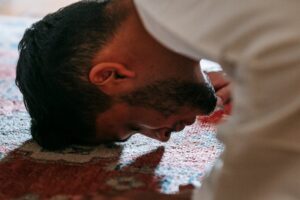From the very first verse revealed to the prophet ﷺ, Allah ﷻ used the term “humans” as a direct relevance to the relationship that should guide us with others as we are all humans! {Read, [O Prophet,] in the name of your Lord who has created. He has created humans from a clinging clot.} 96:1/2.
When people rejected the prophet’s call of truth, he was in pain and grief but Allah ﷻ revealed more verses easing him from his feelings of sorrow. Allah ﷻ said: {Yet, perhaps, [O Prophet,] you would consume yourself, sorrowing upon their traces, if they will not believe in this [divine] discourse.} 18:6.
This message of truth came with a very simple concept – a statement or declaration that there is only One God to be worshiped. Indeed, this is a statement of freedom, freeing people from being enslaved to others or even themselves as one companion eloquently described: “We were chosen to bring people out from worshiping each other to worshiping Allah.”
The concept is clear yet many fall into another dangerous form of enslavement, towards themselves! It may not be in the form of thinking of oneself as divine, but it can create a host of ethical and social problems manifested in various types of social illnesses which adversely affect oneself as well as one’s circle of family and friends, and ultimately, society as a whole.
Selfishness is a manifestation of worshiping self.
Loving oneself is a natural feeling and a necessary one for self-preservation. It is a positive thing when it protects you from harm and helps you elevate yourself in your establishments. But when this natural and necessary feeling becomes extreme, it turns into selfishness and conceit, focusing only on what the self wants or thinks or feels while limiting or blocking the rights and needs of others. When Salman Al-Farisi visited his friend Abu Zarr Al-Ghifari and saw his wife was complaining about his lifestyle, he told him: “Family has rights on you, God has rights on you and you have rights on yourself as well. Balance each one properly.” When the prophet ﷺ later heard what Salman had said, he ﷺ approved.
Envy is a manifestation of worshiping self.
Living among family generally constitutes safety and security, but that was not the case for prophet Yusuf. His own brothers plotted against him and even considered killing him. The extreme envy they felt towards him was the dominating force that prompted them to act on such an evil plan.
Self-sufficiency is manifestation of worshiping self.
Right after the first set of verses were revealed to the prophet ﷺ, the second set of verses revealed how humans can transgress and cross dangerous lines. Allah ﷻ said: {No, indeed! Most surely, man does transgress for he sees himself self-sufficient.} 96:6/7.
People start to believe that they are solely responsible for whatever status of wealth or fame or power they have reached while forgetting that God is the One who brings people up or down as He ﷻ decrees.
What can I do?
It starts by love. The prophet ﷺ said; “No one is a believer unless he loves for his brother that which he loves for himself.” We cannot help every person in the world, but we owe them, at the very least, a feeling of caring, and wishing for them the good things we have or wish to have for ourselves.
It elevates us into good actions. The prophet ﷺ said: “The most beloved person to God is the one other people benefit from the most. And the most beloved deed to God is the ability to bring joy and happiness to other Muslims.”
Avoid causing harm. The prophet ﷺ was asked by a person about good deeds. Each time the prophet ﷺ named a specific good deed, the person replied, “What if I cannot do it?” The prophet ﷺ then said: “Avoid your evil acts towards other people for that is a good deed you donate of yourself.”
Sheikh Kifah Mustapha




